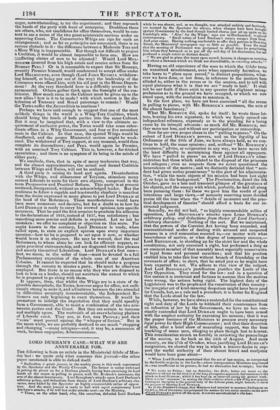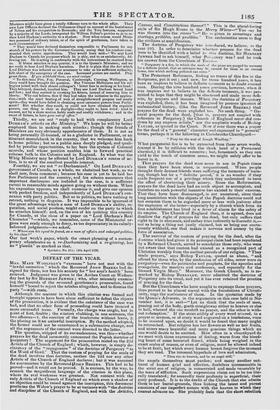LORD DURHAM'S CASE—WHAT WEI ARE ANSWERABLE FOR.
THE following is from an article in the Ministerial Globe of Mon- day last : we quote only what concerns this journal—the other paper mentioned is able to defend itself.
" Radicalism d gants jannes, in the weekly press, is this week represented by the Spectator and the Weekly Chronicle. The former is rather awkward in getting its gloves on for a Durham plaudit, having been exercising its hard hands all the recess in pulling to pieces, with Mr. Roebuck's assistance, the acts of the absent functionary. Lord 13rougham's attacks upon Lord Durham's arbitrary policy, and deductions from thence of Lord Durham's arbitrary cha- racter, were hailed by the Spectator as highly commendable sallies of opposi tion. And the same journal is ready to hail with equal complacency Lord iihrham's attacks, if he will but make attacks next—on the Ministry. " Those, on the other band, who, like ourselves, defended Lord Durham
while he was absent, and, as we thought, was attacked unfairly and factiously are.taunted by the Spectator for silence, when charges have been brougL; against Government by the loud though limited chorus just set up again on his Lordship's aide. Alas! for the Whigs,' says our re-Durhamized, re-glared contemporary. ' Small notice of Lord Durham's return escapes from them. And pour cause. Having nothing comfortable to offer their patrons in Downiog Street, the Ministerial newspapers say as little as possible. Even the taunt that the meeting of Parliament was postponed to afford time for propitiating him whom they betrayed, or to put off the evil day of his disclosures, has not produced a single retort or distinct denial.'
" We are glad to place this taunt upon record, because it charges on ourselves and others a slowness which we think not discreditable, in retorting attacks.",
Having an old experience of the uses to which the Globe turns an unnoticed misstatement, even when apparently harmless, we take leave to " place upon record," in distinct propositions, what- ever we have done, or not done, in reference to the matters here alluded to, either in the recess or in the session, and to tell with equal plainness what it is that we are " ready to hail." It shall not be our fault if there exist in any quarter the slightest misap- prehension as to the ground we have occupied, or which we now stand upon, with the resolution to maintain it. In the first place, we have not been exercised " all the recess in pulling to pieces, with Mr. ROEBUCK'S assistance, the acts of the absent functionary."
What Mr. ROEBUCK did, spoke for itself: he wrote three let- ters, bearing his own signature, to which we freely opened our independent columns, expressly as to the pleading for a losing cause by its intrepid advocate: so much did Mr. ROEBUCK, nei- ther more nor less, and without our participation or censorship. Now for our own proper share in the " pulling to pieces." On the extent of Lord DURHAM'S powers, and on the legality of his
Ordinance of the 29th of June, we have always held, as we con- tinue to hold, the same opinions; and, without " Mr. ROEBUCK'S assistance," advice, or cooperation in any way, we have never felt
the least difficulty in maintaining them against all oppugners. We have " pulled to pieces" no acts of Lord DURHAM'S admi- nistration but those which related to the disposal of the prisoners and refugees ; even as respects them we never questioned the benevolence of the motive ; and we distinctly declared that " acci- dent had given undue prominence" to this part of his administra- tion, " while the main objects of his mission had been lost sight of, or kept in the background." The Proclamation, dated the 9th October, gave us a late and transient glimpse of the greatness of his objects, and the energy with which, probably, he had all along been pursuing them : for these we gave him the credit of good intentions and large views,—of necessity reserving more decided praise till the time when the "details of measures and the prac- tical development of theories" should afford a basis for our in- structed judgment. Secondly, we did not hail, "as highly commendable sallies of opposition, Lord BROUGHAM'S attacks upon LORD DURHAM'S arbitrary policy, and deductions from thence of Lord Durham's arbitrary character." Nothing of the sort. But we maintained, that the powers of the Coercion Act having been exceeded, and unconstitutional modes of dealing with accused and suspected persons in a civil commotion resorted to,—no matter with what benevolence of motive, or what degree of temporary success,— Lord BROUGHAM, in standing up for the strict law and the whole constitution, not only exercised a right, but performed a duty as an eminent member of that assembly most especially conservative of legal forms and personal securities ; and that his position enabled hint to take this line without breach of friendship or the covenants of office; in short, that he acted just as he might have been expected to act. We adhere to this view of the subject. And Lord BROUGHAM'S justification justifies the Lords of the Tory Opposition. They stood for the law : and in a question of this nature it is irrelevant and factious to assume that the motives were wrong, the actions being right. The highest duty of the Legislature was to the people and the constitution of this country : the irregular act of kind-meaning despotism might have been good for Canada, but, as a rule and a precedent, it is better for England that the Lords stood for the law.
While, however, we have always contended for the constitutional right and duty of the Lords to withhold their countenance from an infraction of law by the Government, we have no less con- stantly contended that Lord DURHAM ought to have been armed with the amplest authority for executing his mission ; that it was the proper business of the Ministers to procure every necessary legal power for their High Commissioner ; and that their desertion of him, after a brief show of unavailing support, was the base truckling of mean men, clinging to place though lost to honour. This consideration struck us forcibly in reviewing the proceedings of the session, so far back as the 18th of August. And more recently, on the 27th of October, when justifying Lord DURHAM'S
resignation, we showed the way in which a sincere desire to sup- port the useful authority of their absent friend and coadjutor would have been gone about-
" When Lord Durham ascertained that the act of last session, as interpreted by the hostile majority in the Lords—whose interpretation Ministers acquiesced in—was insufficient in its powers, he had no alternative but to resign ; but the • We wrote on Friday ; but on Saturday, the Globe, before our taunt on the Ministerial silence on the subject of the long prorogatiou appeared, had commenced the attack ou Lord DCRHAM ; which it has keet up at intervals during the present week. There Was no' slowness" in seizing the little evidence which a few Whig newspapers, forming an exception to the general body of the Liberal press, might furnish, to serve the propose or injuring Lord DURIIAM. As to the Standard's charge, that Ministers had intended to summon Parliament on the 4t h or 5th of December, but postponed the session for two entire months on the news of Lord Durmast's arrival off the coat, it remains sescontradicted to this hoar.
Ministers might have given a totally different turn to the whole affair. Their own Law Officers declared the Ordinances illegal on account of the banishment of Nelson and his compatriots to Bermuda ; and the Tory lawyers, supported by a majority of the Lords, interpreted Sir William Follett's proviso so as to re- duce Lord Durham's authority to a shadow. Now what course would Minis- ters possessed of ordinary talent, or of the spirit of gentlemen, have taken in such circumstances?
" They would have declared themselves responsible to Parliament for any stretch of his powers by the Governor-General, seeing that his conduct com- manded their entire approbation. They would have said—' We sent Lord Durham to Canada for purposes which he is ably, and to us satisfactorily, fol. lowing out. Ile is acting in conformity with the instructions he received from us. If blame attaches in any quarter, it is to the Queen's Ministers; and we are ready to bear Lord Durham harmless. But it is plain that the Act which Lord Durham was induced on our assurance to take as his sufficient authority, falls short of the emergency of the case. Increased powers are needed. Pray grant them. If you withhold them, we must resign.' " To this issue Pitt, Fox, Perceval, Castlereagh, Canning, Wellington, or Grey wou,d have brought the question. But Viscount Melbourne and his col- leagues joined with their absent colleague's ' bitter foes in striking at his head.' They betrayed, deserted, insulted him. They saw Lord Durham bound hand and foot; and they assisted in rivetting his fetters, instead of restoring him to liberty. Who can believe, that if they had taken the initiative in the applica- tion—with the erect bearing of men of straightforward purpose and manly spirit—they would have failed in obtaining more extensive powers from Parlia- ment? But whether they could, or could not have obtained the requisite powers, one thing is clear as daylight—they ought to have tried; tried in earnest, not by a sham motion feebly made and readily withdrawn; and in the event of failure, to have gone out of office."
Thirdly, we are not "ready to bail with complacency Lord DURHAM'S attacks on the Ministry:' We hope lie will be better employed than in making such attacks ; though the friends of Ministers are very obviously apprehensive of them. It is not as being personally ill-treated, or as a gladiator in Parliament, or an itinerant mountebank in the country, that we welcome him back to home politics ; but as a public man deeply pledged, and quali- fied by peculiar opportunities, to lay bare the system of Colonial misrule, and whose position enables him to forward practical reforms both it: the Colonies and in England. In what way the Whig Ministry may be affected by Lord DURHAM'S course of ac- tion, is to us of the smallest possible interest.
Fourthly, we are not " re-Durharnized." On Lord DURHAM'S government of Canada, as a whole, we abstained last week, as we shall now, from comment ; because his case is yet to be laid be- fore Parliament and the country, and his solemn assurance that important disclosures are included in the case, is a sufficient caveat to reasonable minds against going on without them. When his exposition appears, we shall examine it, and give our opinion with perfect freedom, and independently of Lord DURHAM'S con- nexion with party politics. But as to politics, we have nothing to retract, nothing to disguise. It was impossible to be ignorant of the great advantage which a man of Lord DURHAM'S ability, re- putation, and social position, might confer on the party to which he attaches himself: and, on the eve of his quitting this country for Canada, at the close of a paper on " Lord Durham's Real Character" *—which, we remember, some of the Ministerial or- gans were ready enough to decry, as too depreciatory in its calmly- balanced judgments—we asked, " Where can his equal be found, as a man of affairs and enlarged politics, in his class?"
Our last week's paper, which the smart phrasing of a contem- porary adumbrates as a re-Durhamizing and a re-gloving, has no" plaudit" so marked as that.
• spectator, No. 511; 14th April 183.4.



























 Previous page
Previous page